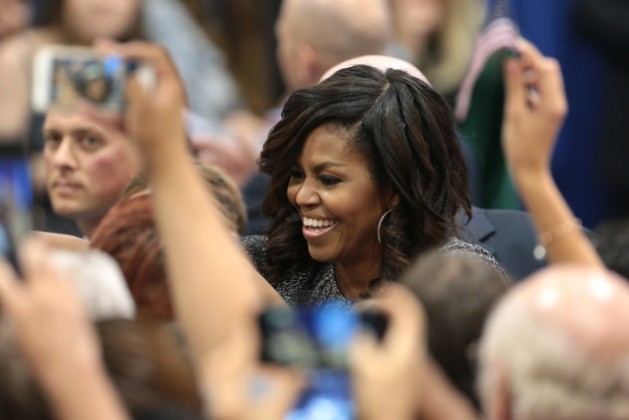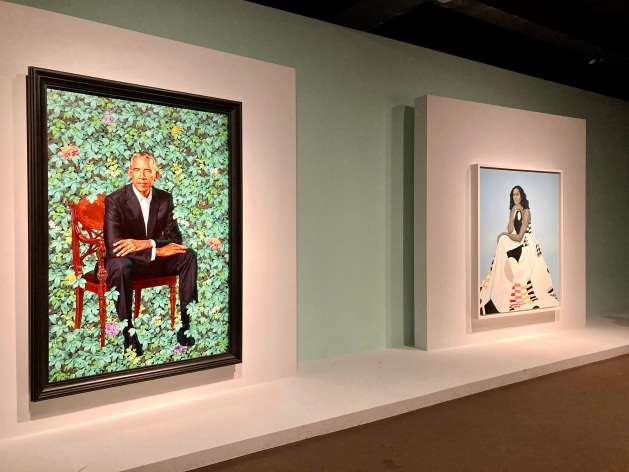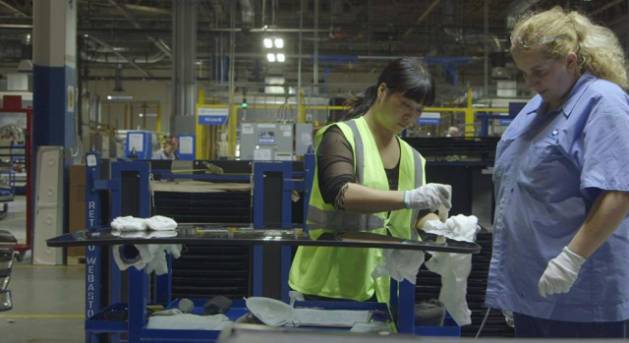After striking out the day before, we finally got to see the National Portrait Gallery paintings of Barack and Michelle Obama at the Museum of Fine Arts. It was a wonderful experience, and we enjoyed learning more about the artists, Kehinde Wiley and Amy Sherald. I regard Obama and Dwight Eisenhower as the two best presidents of my lifetime, and I was too young to remember Ike.
Tag: Michelle Obama

Photo via @joebiden on Instagram.
Joe Biden delivered a fantastic, powerful and uplifting speech. I’m blown away. It was perfectly suited to who he is. He may not be an orator on the level of Barack Obama, but Obama couldn’t have given a speech that was so personal and intimate.
Not only was it the best speech of Biden’s life, but I also thought it was the best speech of the week — outshining some truly terrific moments from both Obamas and from Kamala Harris. I don’t see how the Democrats could possibly have done any better than they did with their virtual convention.
A word we’ve heard a lot this week is “empathy.” I don’t think we’re going to hear it much next week. Or see it, for that matter. Can we finally bring the Trump nightmare to a close?

Photo (cc) 2016 by Gage Skidmore
A Michelle Obama for vice president boomlet is now under way. This would be a very bad idea. Joe Biden is 77, and, if he’s elected, there’s a good chance that his running mate will become president before his first term is up. Obama has no relevant experience beyond being a former first lady. You can be sure that would be used against her during the campaign. And let’s not forget that Obama has said over and over that she has no intention of ever seeking political office.
I actually think Obama would make a decent president because, like most normal people, she has the humility to know what she doesn’t know. She’s wicked smart, and she would almost certainly choose good advisers and listen to them. One of those advisers, obviously, would be Barack Obama. So a Michelle Obama presidency would probably work out OK.
But for Biden to choose someone with no history in elected or appointed government office would be a political disaster. He’s promised to pick a woman, and I think he ought to choose a woman of color. Kamala Harris would be an excellent choice, though there are others, too.
Maybe putting Michelle Obama on the ticket would turn out to be a stroke of genius. She’s popular and likable. But choosing her would be wildly unconventional, and there’s too much at stake to take that kind of chance.
Previously published at WGBHNews.org.
The botched Iowa caucuses and the State of the Union mark the official opening of the presidential campaign. From now until November, you’re going to hear a lot about whether Democrats can take voters in the Midwest back from President Trump.
And so politics was very much on my mind when I watched “American Factory” over the weekend. The Netflix documentary, the first released by Barack and Michelle Obama’s production company, Higher Ground, tells the story of a glass factory opened by the Chinese in 2016 at the site of a former General Motors plant near Dayton, Ohio. The film has been nominated for an Oscar. (Note: Spoiler alerts ahead.)
When we talk about the working-class voters who defected to Trump in 2016, we are inevitably talking about white working-class voters. But the people who were hired by the Fuyao glass company — many of them former GM employees — comprised an integrated workforce. At least as depicted in the film, the white and African American employees get along, and though they resent their Chinese co-workers and managers for what they perceive as unrealistic demands, we don’t hear anything even remotely racist from the Americans.
The Chinese are another story. Early in the film, we hear the chairman of Fuyao, the billionaire entrepreneur Cao Dewang, say of the Americans: “They’re pretty slow. They have fat fingers.” Later we hear complaints from the Chinese that the Americans are too soft, unwilling to work overtime, and — worst of all — lacking in gratitude because they were trying to form a union. After U.S. Sen. Sherrod Brown puts in a good word for unions at the plant’s opening, we see an American manager joking to one of the Chinese executives that Brown’s head should be cut off (what a card!) and promising that Brown would be banned from future events.
The jobs, though, were a far cry from what GM had once offered. During the union-organizing drive, one of the American employees at Fuyao says that his full-time position paid just $27,000 — and that his daughter was making $40,000 in a nail salon. Fuyao may have brought blue-collar work back to the Dayton area, but at $12 an hour (raised to $14 in an attempt to head off the union), they were hardly the kind of well-paying jobs that had once made the Midwest a prosperous outpost of Democratic union households.
“We will never, ever make that kind of money again,” says one of the GM-turned-Fuyao employees. “Those days are over.”
The end of that era, decades in the making and accelerated by the Great Recession, has fueled resentment and hopelessness. As Trump tells us over and over, the unemployment rate is as low as it’s been in many years and the stock market is booming. Yet growing income inequality has led to stagnant or worsening living standards for all but the wealthy, the specter of college debt acts as a barrier to economic opportunity, and — as Boston College history professor Heather Cox Richardson said recently on WGBH News’ “The Scrum” — structural flaws in our system have elevated a small class of rich oligarchs who wield power over a majority that neither voted for them nor support their policies.
At the end of “American Factory,” we see robotic arms moving glass efficiently around the factory. Chairman Cao tours the floor with his executives as they show him the operations that will be replaced by machines in the coming years. As of 2018, we’re told as the film closes, the factory had achieved profitability — but that starting wages remained stuck at $14 an hour.
What’s disheartening is that, on one level, the Fuyao experiment worked. In return for tax incentives, a factory that had closed miraculously reopened, employing some 2,400 Americans and 200 visiting Chinese. What Fuyao didn’t bring back — and perhaps couldn’t bring back — were the middle-class wages and lifestyles that for several generations had been seen as a birthright by people who may not have gone to college but who were willing to work hard.
We are no closer to charting a path for them than we’ve been in the past several elections. Trump offers them nothing but anger and resentment. Several of the Democratic candidates have devised ambitious proposals to soak the rich and invest in their future, but we all know how difficult it is to turn even the best-devised plans into reality.
In the end, “American Factory” is a snapshot of a way of life that continues to decline. How that narrative will intersect with the 2020 campaign is anybody’s guess — but we should start getting some answers this week.
If Michelle Obama had gone on any longer, she risked being nominated for president. What a magnificent speech from a great First Lady.
In my latest for the Guardian, I argue that complaints about Michelle Obama’s Spanish vacation are just the latest manifestation of a by-now-old ritual, in which the mainstream media allow themselves to be bullied by right-winger activists into promoting a non-story.
Jake Tapper reports that Sarah and Todd Palin are former members of the Alaskan Independence Party, whose motto is “Alaska First — Alaska Always.” The controversy, Tapper says, is over how hard the party has pushed for independence from the United States. But it gets a whole lot better than that.
According to Lynette Clark, a top party official with whom Tapper spoke, the Palins were members in 1994, and attended the party’s statewide convention, in Wasilla, that year. Sarah Palin quit the party in 1996 in order to run for mayor of Wasilla; there is no indication of when she first joined.
Why are these dates important? Because party founder Joe Vogler, who was chairman right up until his death in 1993, was a “sulphurous” presence known for his “‘America be damned’ rhetoric delivered at D-9-cat decibels,” according to an Anchorage Daily News editorial published in 1998.
America be damned? Gee, who does that remind you of? And could the Palins have been ignorant of Vogler’s views in 1994?
To this day, the Alaskan Independence Party’s Web site proudly carries the following quote from Vogler: “I’m an Alaskan, not an American. I’ve got no use for America or her damned institutions.” And Tapper found that Palin had sent a video message to the party’s annual convention just last year.
I’m leery of relying on Wikipedia, but, given what we already know about Vogler, this seems safe: he was murdered, and, as he had previously made it clear that he wished not to be buried under the American flag, he was buried instead in the Yukon.
Country first, eh, Sen. McCain?
Let me jump ahead to the defense we can anticipate: the Alaskan Independence Party is part of the cultural milieu of Alaska, it doesn’t mean the same thing to Alaskans as it would to us, Palin is really a patriotic American, blah blah blah. And you know what? I have no trouble believing any of that.*
Just as I had no trouble believing that Barack and Michelle Obama are patriotic Americans despite their long membership in the Rev. Jeremiah Wright’s church.
*But you know what? On reflection, I wouldn’t be surprised if Palin thought Alaskan independence was kind of a neat idea. That would have been the whole point to joining the party, right?
I’m watching Michelle Obama speak to an Emily’s List gathering on CNN.com right now. And though I liked her speech last night well enough, I find it interesting that she seems much more relaxed and natural today, without sacrificing any of the warmth she projected on the big stage.
In my latest for the Guardian, I argue that two contrasting speeches by Michelle Obama show she understands what works in Chicago doesn’t work on the national stage. Unfortunately for Democrats, the Obamas’ efforts to reinvent themselves risk making them seem inauthentic and leave them vulnerable to Republican attack.
She was appealingly nervous and sincere. Given that she’s been caricatured as Angela Davis, only less fun, all she really had to do was come across as normal and friendly. Which she did. And the girls are adorable.


